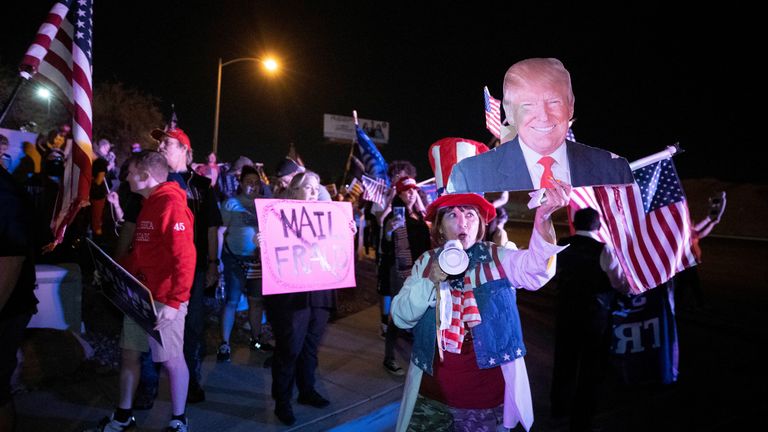Facebook has banned a group which, inspired by unsubstantiated claims from Donald Trump, was featuring calls for violence over concerns the election was being “stolen” by the president’s rivals.
It comes as Joe Biden took the lead in the key state of Georgia, while Donald Trump doubled down on his claims political opponents were trying to rig and steal the US election, despite criticism from some Republicans.
US election 2020 live: Follow the latest updates
The group issued a call for donations as well as “boots on the ground to protect the integrity of the vote”, and has rapidly grown in popularity since Wednesday.
The president’s supporters – some armed with rifles and handguns – descended on election counting centres where mail-in ballots continue to be tallied up, chanting in some for vote counting to be halted, and in others for it to be accelerated, depending on whether Mr Trump was ahead or behind.
It follows Facebook founder and chief executive Mark Zuckerberg warning back in September of “an increased risk of civil unrest across the country” due to the anticipated delays in counting postal ballots.
A spokesperson for Facebook said: “In line with the exceptional measures that we are taking during this period of heightened tension, we have removed the Group ‘Stop The Steal,’ which was creating real-world events.
“The group was organised around the delegitimisation of the election process, and we saw worrying calls for violence from some members of the group.”
Numerous replacement groups have been established following the main one being banned. Facebook said it would continue to monitor for any activity which violated its rules, and has already banned the #stopthesteal hashtag.
Imran Ahmed, chief executive of the Centre for Countering Digital Hate, told Associate Press: “There is a systemic issue with Facebook groups being exploited by people spreading misinformation, hate and inciting violence.
“It’s a problem they have known about for a long time and they continue to fail to take proper action. It’s generally only when a lot of attention is placed on something that they act.”
In the years following the 2016 election, social platforms faced a barrage of allegations that their incompetence or apathy contributed to undermining the integrity of the electoral process by allowing disinformation to reach millions of voters.
Hostile foreign actors, in particular those sponsored by the Russian state, were found to have flooded social media platforms with messages designed to amplify the divisions between Americans on a number of topics, especially discussions around race.
Twitter and Facebook have both taken action against unsubstantiated messages from Mr Trump alleging that the election is being stolen.
But Professor Jennifer Grygiel, a social media expert at Syracuse University, told Associated Press that the actions by Twitter and Facebook were not proving effective at tackling this risk.
In the states of Arizona and Michigan, mostly unmasked crowds chanted “stop the steal” following the president’s unsubstantiated claims that votes for him were deliberately not being counted.
It took more than 15 minutes for Twitter to obscure a Donald Trump message on Wednesday which claimed that election staff were “working hard” to make his lead in Pennsylvania “disappear”, during which time the claim had been widely spread.
“Twitter can’t really enforce policies if they don’t do it before it happens, in the case of the president,” Professor Grygiel said. “When a tweet hits the wire, essentially, it goes public. It already brings this full force of impact of market reaction.”

